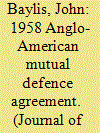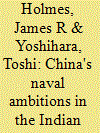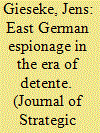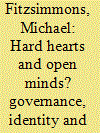| Srl | Item |
| 1 |
ID:
082242


|
|
|
|
|
| Publication |
2008.
|
| Summary/Abstract |
Written on the 50th anniversary, this article focuses on the negotiations between Britain and the United States which led to the 1958 Mutual Defence Agreement and the beginning of the 'special nuclear relationship' which has lasted down to the present day. It is argued that the eventual success of the negotiations had a lot to do with the key roles of Eisenhower and Macmillan but that a transatlantic 'advocacy coaltion' of nuclear scientists, defence and intelligence officials also played an important part at the operational level in achieving and subsequently shaping the kind of relationship which developed. Attention is also given to the longer term significance of the agreement, especially in terms of the arguments about its impact on nuclear proliferation.
|
|
|
|
|
|
|
|
|
|
|
|
|
|
|
|
| 2 |
ID:
082243


|
|
|
|
|
| Publication |
2008.
|
| Summary/Abstract |
The debates on the pace, scope and nature of Ottoman military reform tend to be dominated by domestic and/or cultural explanations. Issues of military competition and efficiency, embodied in Neorealist perspectives, might appear to have little to offer as an explanatory tool in the Ottoman context. This article argues that this view is mistaken. First, despite their value, there remains an indeterminacy about domestic and cultural explanations that limits their usefulness as single-cause explanations. Second, Neorealism does generate valuable insights into the dynamics of military reform in the Ottoman Empire; issues of military competition and efficiency do matter in explaining the nature of Ottoman military reform during this period. Ultimately, domestic, cultural, and Neorealist perspectives are complementary, and mono-causal explanations of eighteenth century developments in the Ottoman military are likely to be too simplistic
|
|
|
|
|
|
|
|
|
|
|
|
|
|
|
|
| 3 |
ID:
082240


|
|
|
|
|
| Publication |
2008.
|
| Summary/Abstract |
This article argues that an increasingly sea-power-minded China will neither shelter passively in coastal waters, nor throw itself into competition with the United States in the Pacific Ocean. Rather, Beijing will direct its energies toward South and Southeast Asia, where supplies of oil, natural gas, and other commodities critical to China's economic development must pass. There China will encounter an equally sea-power-minded India that enjoys marked geostrategic advantages. Beijing will likely content itself with 'soft power' diplomacy in these regions until it can settle the dispute with Taiwan, freeing up resources for maritime endeavors farther from China's coasts.
|
|
|
|
|
|
|
|
|
|
|
|
|
|
|
|
| 4 |
ID:
082241


|
|
|
|
|
| Publication |
2008.
|
| Summary/Abstract |
East Germany was one of the main actors in Cold War military and security policy intelligence. Due to the opening of the archives of the Ministry for State Security (Stasi) of the German Democratic Republic it is possible today to analyse methods and goals of the East German civil and military intelligence services on this field in more detail. The article summarises the state of research on staff and sources of these services. Based on this information, main directions and operational fields are exemplified for military and international strategic intelligence in the era of d tente of the 1970s. Contents and quality of intelligence results are focused with respect to their potential influence on East German and Warsaw Pact (i.e. Soviet) decision-making processes.
|
|
|
|
|
|
|
|
|
|
|
|
|
|
|
|
| 5 |
ID:
082239


|
|
|
|
|
| Publication |
2008.
|
| Summary/Abstract |
The premise of most Western thinking on counterinsurgency is that success depends on establishing a perception of legitimacy among local populations. The path to legitimacy is often seen as the improvement of governance in the form of effective and efficient administration of government and public services. However, good governance is not the only basis for claims to legitimacy, especially in environments where ethnic or religious identities are politically salient. Some experience in Iraq suggests that in environments where such identities are contested, claims to legitimacy may rest primarily on the identity of who governs, rather than on how whoever governs, governs. This article outlines the intellectual foundations of existing policy and doctrine on counterinsurgency, and argues that development and analysis of counterinsurgency strategy would benefit from a greater focus on the role of ethnic and religious identity in irregular warfare.
|
|
|
|
|
|
|
|
|
|
|
|
|
|
|
|